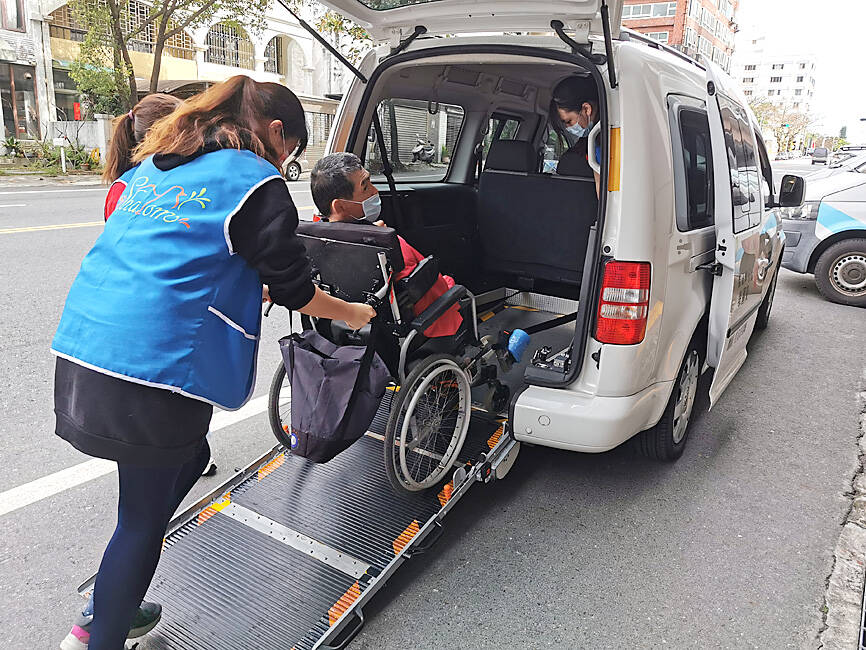The government is deliberating whether to provide disability benefits to more foreign nationals in Taiwan in response to a petition calling for disability inclusion, a health official said on Friday.
The Ministry of Foreign Affairs is identifying the 10 countries with the most residents in Taiwan and ascertaining whether Taiwanese expats in those countries are entitled to disability benefits, said Chang Mei-mei (張美美), deputy head of the Social and Family Affairs Administration at the Ministry of Health and Welfare.
The administration, which is in charge of issuing disability certificates that provide holders with different types of benefits, consulted with the ministry on May 18 after the Crossroads nongovernmental organization last month launched a petition on a government-run platform urging equal access to disability benefits for foreign residents.

Photo courtesy of New Dawn Organization
The petition must collect 5,000 signatures by June 13 to require an official response from the health ministry.
It had collected 558 signatures as of 6pm yesterday.
Briton Michael Boyden, who has been living in Taiwan for 34 years, said he has atypical Parkinsonian disorder, but he is not granted home visits by medical professionals to evaluate his needs and not entitled to subsidies when purchasing assistive devices or benefits for respite care.
An anonymous US resident of Taiwan for 13 years wrote on the platform: “This is for my 4-year-old child born here [Taiwan] — she is unable to get a disability certification, making her ineligible for subsidies for travel to doctors [sic] appointments or medical equipment.”
The petition urges the health ministry to revise its application rules to qualify foreign residents for a disability certificate in observance of the UN Convention on the Rights of Persons with Disabilities, which Taiwan incorporated into law in 2014.
In accordance with the convention and domestic law, the government is duty-bound to safeguard the rights and interests of all disabled individuals, Crossroads said.
Taiwan leads the world in many human rights and democracy indicators. However, not recognizing the disabilities of foreign nationals with a disability certificate and providing support is still an area that requires immediate improvement, the petition says.
Immigrants contribute their youth, experience, wisdom and energy to Taiwan — they pay taxes, contribute to the national revenue and start companies that hire local employees, it says.
“Taiwan cannot abandon them in the event they become disabled due to age, disease, an accident, or a genetic condition,” the petition says.
Japan is the only country whose residents in Taiwan are eligible for a disability certificate, according to a government document issued in 1998 by the Ministry of the Interior.
Based on the principle of reciprocity, the government would issue disability certificates to foreign residents whose countries give Taiwanese the same protections, Chang said.
In Taiwan, a disability certificate is necessary to access disability benefits, including financial assistance for medical equipment or services, living allowances, special education resources and parking permits.

Chinese Nationalist Party (KMT) Chairman Eric Chu (朱立倫), spokeswoman Yang Chih-yu (楊智伃) and Legislator Hsieh Lung-chieh (謝龍介) would be summoned by police for questioning for leading an illegal assembly on Thursday evening last week, Minister of the Interior Liu Shyh-fang (劉世芳) said today. The three KMT officials led an assembly outside the Taipei City Prosecutors’ Office, a restricted area where public assembly is not allowed, protesting the questioning of several KMT staff and searches of KMT headquarters and offices in a recall petition forgery case. Chu, Yang and Hsieh are all suspected of contravening the Assembly and Parade Act (集會遊行法) by holding

PRAISE: Japanese visitor Takashi Kubota said the Taiwanese temple architecture images showcased in the AI Art Gallery were the most impressive displays he saw Taiwan does not have an official pavilion at the World Expo in Osaka, Japan, because of its diplomatic predicament, but the government-backed Tech World pavilion is drawing interest with its unique recreations of works by Taiwanese artists. The pavilion features an artificial intelligence (AI)-based art gallery showcasing works of famous Taiwanese artists from the Japanese colonial period using innovative technologies. Among its main simulated displays are Eastern gouache paintings by Chen Chin (陳進), Lin Yu-shan (林玉山) and Kuo Hsueh-hu (郭雪湖), who were the three young Taiwanese painters selected for the East Asian Painting exhibition in 1927. Gouache is a water-based

Taiwan would welcome the return of Honduras as a diplomatic ally if its next president decides to make such a move, Minister of Foreign Affairs Lin Chia-lung (林佳龍) said yesterday. “Of course, we would welcome Honduras if they want to restore diplomatic ties with Taiwan after their elections,” Lin said at a meeting of the legislature’s Foreign Affairs and National Defense Committee, when asked to comment on statements made by two of the three Honduran presidential candidates during the presidential campaign in the Central American country. Taiwan is paying close attention to the region as a whole in the wake of a

OFF-TARGET: More than 30,000 participants were expected to take part in the Games next month, but only 6,550 foreign and 19,400 Taiwanese athletes have registered Taipei city councilors yesterday blasted the organizers of next month’s World Masters Games over sudden timetable and venue changes, which they said have caused thousands of participants to back out of the international sporting event, among other organizational issues. They also cited visa delays and political interference by China as reasons many foreign athletes are requesting refunds for the event, to be held from May 17 to 30. Jointly organized by the Taipei and New Taipei City governments, the games have been rocked by numerous controversies since preparations began in 2020. Taipei City Councilor Lin Yen-feng (林延鳳) said yesterday that new measures by